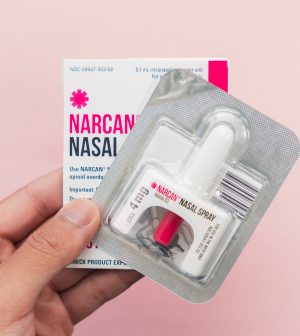- Could Your Grocery Store Meat Be Causing Recurring UTIs?
- Are You Making This Expensive Thermostat Error This Winter?
- Recognizing the Signs of Hypothyroidism
- 10 Strategies to Overcome Insomnia
- Could Artificial Sweeteners Be Aging the Brain Faster?
- Techniques for Soothing Your Nervous System
- Does the Water in Your House Smell Funny? Here’s Why
- Can a Daily Dose of Apple Cider Vinegar Actually Aid Weight Loss?
- 6 Health Beverages That Can Actually Spike Your Blood Sugar
- Treatment Options for Social Anxiety Disorder
FDA Panel Considers Making Opioid Antidote Drug Available Without Prescription

A nasal spray that can reverse an opioid overdose may become available for easier over-the-counter purchase.
U.S. Food and Drug Administration advisers are meeting Wednesday to discuss making generic naloxone hydrochloride available without requiring interaction with a pharmacist, CNN reported.
Approval could happen later this year. Research shows that wider availability of the antidote could save lives in the growing U.S. opioid epidemic.
The meeting of the FDA’s Nonprescription Drugs Advisory Committee and the Anesthetic and Analgesic Drug Products Advisory Committee is a response to an application submitted last year by Emergent BioSolutions, Inc. of Baltimore.
The FDA gave the company’s application priority review, CNN reported.
Emergent has said in briefing documents that its nasal spray was designed to be administered by people who have no medical training. Naloxone is available in various strengths and applications. The spray is easier to administer than an injection, the company said.
Naloxone is used to revive those believed to be overdosing on opioids. There are no known harmful effects if it is given to someone who is not on opioids.
Although naloxone is already available without a prescription, it must be obtained directly from a pharmacist. Not all pharmacies stock it, CNN reported.
“Allowing it to be over-the-counter in the same manner in every state really clears up some confusion and hopefully clears up some of that red tape,” said Kirk Evoy, a clinical associate professor of pharmacotherapy at the University of Texas at Austin who has studied the issue.
Allowing naloxone to be sold without a pharmacist’s involvement may remove some of the stigma associated with it, he said.
“I would hate for that to be the reason why somebody doesn’t have access to a drug that could save a life,” Evoy told CNN.
The Biden administration has been pushing to make naloxone more available, CNN reported.
In the year ending August 2022, more than 107,000 people in the United States died of a drug overdose. More than two-thirds of those deaths involved fentanyl and other synthetic opioids, according to the U.S. Centers for Disease Control and Prevention.
In general, dispensing of opioid painkillers is down, hitting a 15-year low in 2020 of 43 prescriptions for every 100 people, according to the CDC.
Naloxone has been approved by the FDA since 1971. It was first used in hospitals and by first responders to resuscitate those who might have died of an overdose, CNN reported.
Laws allow naloxone to be sold without a prescription in all 50 states, Puerto Rico and Washington, D.C.
Briefing documents suggest the FDA will ask about the new medication’s label and how easy it is to use.
Good Samaritan laws in most states would protect people who administer the medication to someone who is overdosing, CNN reported.
“The more you can administer naloxone, the more likely it is that we’ll have positive results,” Evoy said. “And more likely we’ll be able to save a life with this medication.”
More information
The U.S. Centers for Disease Control and Prevention has more on the opioid overdose epidemic.
SOURCE: CNN, Feb. 15, 2023
Source: HealthDay
Copyright © 2026 HealthDay. All rights reserved.










